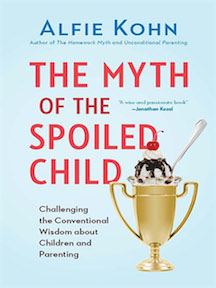By David Partenheimer
If one trusts the reportage of both the liberal and conservative media, then contemporary parents are permissive and their children are coddled, entitled, narcissistic, and undisciplined. In The Myth of the Spoiled Child, Alfie Kohn debunks these notions. In the first place, he simply discounts them as false and undocumented. Furthermore, he shows that these negative perceptions of involved parents and so-called spoiled children are probably misconstrued positive traits. For example, when a young person focuses on his or her projects and goals, he or she might be called egocentric. If he or she has faith in her capabilities and high expectations about what life has in store, he or she might be accused of entitlement. In both cases, the young person is behaving precisely as one should in order to enter the adult world and succeed in it.
The most practical and useful chapter for involved parents is the one in which Kohn shows that the media’s depiction of “helicopter-parenting” is grossly exaggerated. He discredits the claim that involved parenting results in sheltered, entitled adolescents and young adults poorly prepared for harsh realities of life. In fact, studies show that the opposite is the case. For example, college students whose parents were involved in their lives were more satisfied with their college experience and had higher levels of academic engagement.
On the other hand, controlling and intrusive parents do thwart their children’s development, especially their sense of well-being. One of Kohn’s major arguments is that punitive and controlling parents generally produce children who are less empathetic and more aggressive and self-centered. Therefore, he recommends that parents respond to their children’s needs and use a reasoned and collaborative approach to discipline. Though he documents the effectiveness of this approach well, he ignores the role of inborn traits in the development and outcome of children.
Perhaps Kohn goes too far with his iconoclasm when he claims that extrinsic motivation through rewards is generally harmful because it makes one person the winner and the rest losers. Instead, he recommends intrinsic motivation so that everyone succeeds in his or her own way. He argues that instead of making children want to try harder, failure has a demoralizing effect, and the scarcity of rewards (such as only one valedictorian) makes them less motivated to improve. Though Kohn is critical of extrinsic rewards and competition, would he continue writing articles and books if there were no reward of publication?
The Myth of the Spoiled Child is perfect reading for Phi Beta Kappa parents who want to raise psychologically healthy, intellectually curious, and compassionate children. Kohn’s vision opens up a gentler and kinder world where children are heard, respected, and supported by parents who can do so without being labeled permissive or coddling. Such values touted in media as self-discipline, self-control, grit, and perseverance promote conformity and produce children who do what they are told without questioning authority. The alternative to this mindless obedience is reflective rebelliousness, the ability to analyze the decisions of authority and make a reasoned choice about when to stand up for what one believes.
David Partenheimer (ΦBK, University of Utah, 1971) is a professor of English at Truman State University and a resident member of the Delta of Missouri chapter of Phi Beta Kappa.




